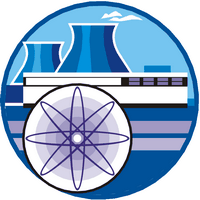 An idea that has been occasionally discussed is to use the space elevator to launch radioactive waste to the sun, a permanent waste disposal plan if there ever was one…
An idea that has been occasionally discussed is to use the space elevator to launch radioactive waste to the sun, a permanent waste disposal plan if there ever was one…
The magazine Popular Science had an article about this in 2010. It’s been a subject of blog discussions/debates (like this one on PhysicsForum and this one on the ScienceForum). It was even a topic during the “Shotgun Science” section of the 2013 Space Elevator Conference (I can’t remember who did that particular presentation).
German blogger Kai Malmus gives us his uniquely European thoughts on this topic here. According to Mr. Malmus, a Commission (put into action by the German government and all opposition parties) has been empowered to find a solution within the next couple of years and then start construction by of a waste storage unit here on earth by 2032. All of Europe, indeed all of the fission-using world, is searching for an answer to this problem. And, anyone who has followed the Yucca Mountain nuclear waste depository saga in the USA over the past 25+ years, knows that it is a political football to end all political footballs.
Is using a Space Elevator to get rid of nuclear waste a practical idea? I don’t think so, but not for the “usual reasons”. People worry about the safety of the elevator but I believe we can produce an elevator lift system of very high reliability. Payloads will all have some sort of guidance system so that if the unlikely happens, they can be safely splash-landed in the ocean. And people worry about somehow contaminating the sun with this waste. The sun is so enormous, that it could handle this relative paltry amount of additional matter without even noticing it.
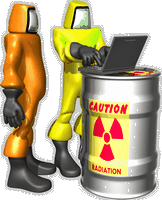 However, “paltry amount” is, as I said, relative, and therein lies the problem, IMHO.
However, “paltry amount” is, as I said, relative, and therein lies the problem, IMHO.
How much nuclear waste do we produce each year? According to World Nuclear Association website, about 200,000 metric tons of low and intermediate levels of waste and about 10,000 metric tons of high-level nuclear waste are produced each year. And then there is the “legacy waste problem“, hundreds of thousands of more metric tons of waste that must be dealt with somehow.
Assuming that we’re not going to see a functioning space elevator until probably at least 2035 (and I’m being optimistic here) and the fact that the initial elevator(s) aren’t going to carry more than double-digit tons of payload (and there will be multiple customers clamoring for the space elevator’s services) and the fact that the nuclear industry is continuing to produce nuclear waste, I’m afraid that this is a problem which is going to have to be solved here, on the planet, without the help of a Space Elevator.
I wish I could be more optimistic – the idea sounds grand, kind of like space-based solar power. But when you run the numbers, then things don’t look so cheery…
Perhaps only a very tiny portion of this waste truly needs to be disposed of, then maybe. But if that’s true, then it can probably be dealt with here and we won’t need a space elevator to get rid of it.
But I invite debate on the matter – prove me wrong!

 Each year, the
Each year, the 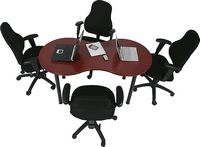 Another Space Elevator Conference is in the books, three very interesting and successful days. There were a lot of highlights and, in no particular order (and just my own opinion, of course) they are;
Another Space Elevator Conference is in the books, three very interesting and successful days. There were a lot of highlights and, in no particular order (and just my own opinion, of course) they are;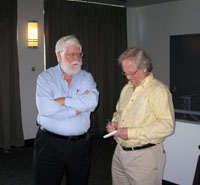
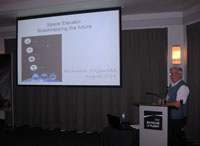
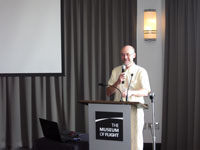
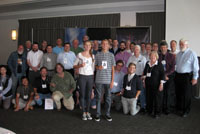
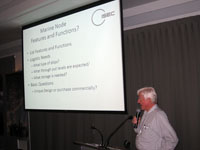
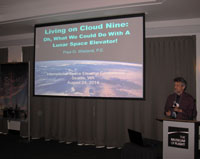
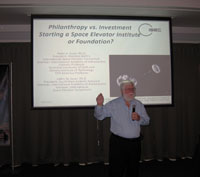
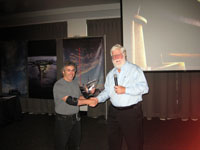
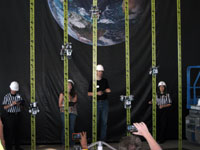
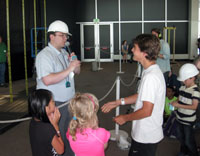
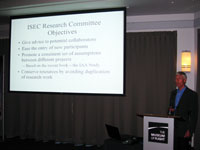
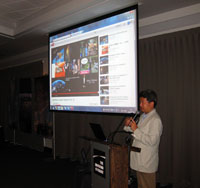
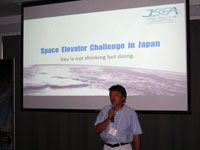
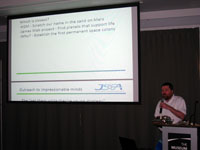
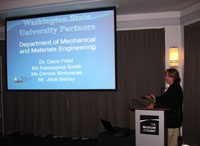
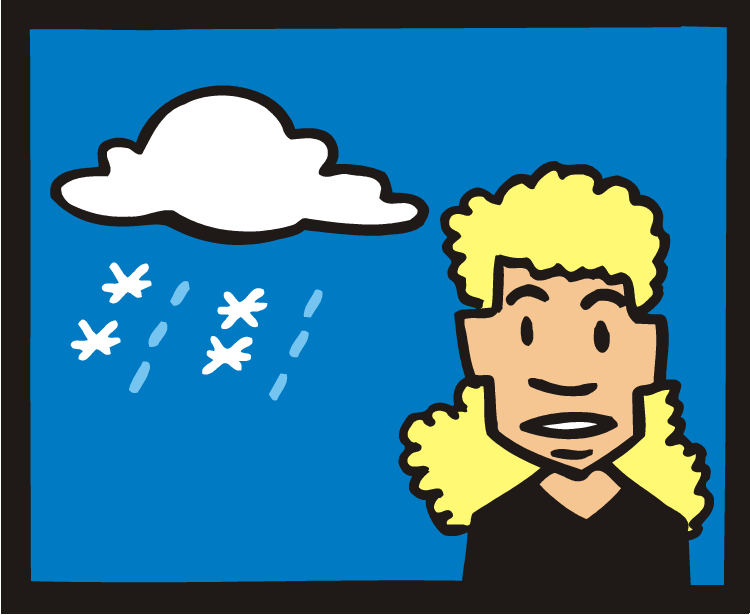 The afternoon sessions were all technical ones and I think it’s safe to say all attendees learned a lot. It’s hard for me to pick a favorite, but I must comment on the final session of the day, on Weather; how it can be measured, how it can be forecast and what it means for a space elevator. The presenter, Winifred Crawford ended her presentation with the suggestion that we start recruiting a meteorologist (or two) and freely admitted that she was hooked on the concept of the Space Elevator.
The afternoon sessions were all technical ones and I think it’s safe to say all attendees learned a lot. It’s hard for me to pick a favorite, but I must comment on the final session of the day, on Weather; how it can be measured, how it can be forecast and what it means for a space elevator. The presenter, Winifred Crawford ended her presentation with the suggestion that we start recruiting a meteorologist (or two) and freely admitted that she was hooked on the concept of the Space Elevator.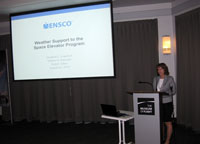
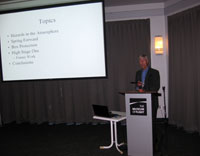
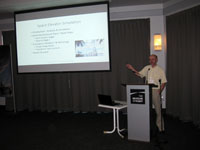
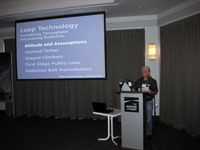
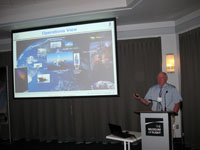
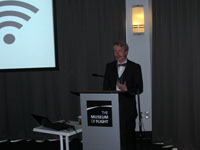
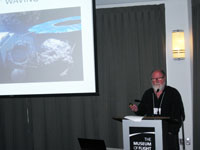
 It’s Friday, August 22nd, 2014 and that means it’s the first day of the 2014
It’s Friday, August 22nd, 2014 and that means it’s the first day of the 2014  I’m bringing all this up because when I left the hotel this morning, riding down in the elevator with me was a young couple and the lady was wearing a Chicago Blackhawks TShirt. I commented to them that “I like your TShirt”. They smiled and asked me if I was from Chicago. When I said I was, they said they were too. I asked them if they were going to watch the Bears-Seahawks game tonight and they said they were actually going – they had tickets! I’m jealous.
I’m bringing all this up because when I left the hotel this morning, riding down in the elevator with me was a young couple and the lady was wearing a Chicago Blackhawks TShirt. I commented to them that “I like your TShirt”. They smiled and asked me if I was from Chicago. When I said I was, they said they were too. I asked them if they were going to watch the Bears-Seahawks game tonight and they said they were actually going – they had tickets! I’m jealous.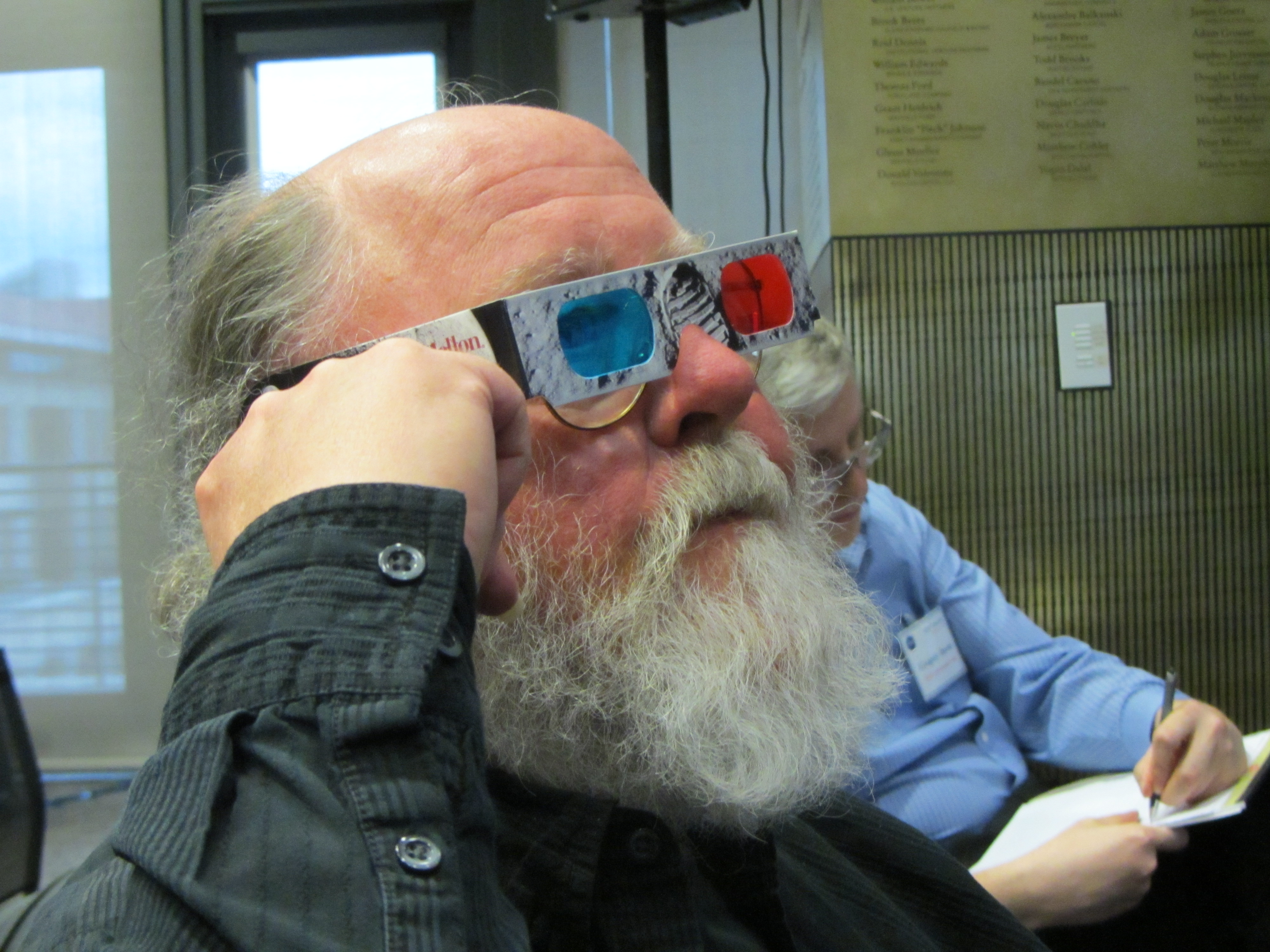 Science writer Leonard David is going to be attending the upcoming
Science writer Leonard David is going to be attending the upcoming  Registration for the upcoming
Registration for the upcoming